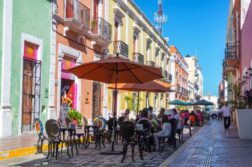Here are some tips to make sure your fun time helps locals and doesn’t leave a mess behind
By Debbie Slobe
In just a few days, schools across Mexico will close for the Semana Santa and Pascua (Easter) holidays. Many Mexican families take vacations during this time, and the holidays often coincide with student spring breaks in the United States and Canada.
The result is millions of people descending on beaches and other tourist destinations throughout the country over a short span of two weeks.
For big beach towns like Cabo San Lucas and Cancún, the influx of visitors is more easily absorbed (although it still takes a huge toll) as there are already big hotels, decent infrastructure and services set up for large numbers of tourists.
But for smaller beach communities like Puerto Escondido, Sayulita, San Pancho and Chacala, Nayarit, (where I live), the temporary doubling or even quintupling of the local population can take a serious toll on the infrastructure and environment.
Take Chacala, for example. Our permanent, year-round resident population is around 350 people. During the high season for tourists, the population triples to about 1,000 people. But during the Semana Santa and Pascua holidays, it can grow to 2,000 or more.

We have no centralized water treatment facility here and not nearly enough public trash cans. And suddenly, more than five times the usual number of people are using the septic tanks and garbage cans (if the trash even makes it to a garbage can).
It can get ugly fast.
As Semana Santa and Pascua approach, it’s important to think about ways we can reduce our impact on the places we visit and better support local communities during this hectic time. Here are some ideas for how to tread more lightly and do more good during your travels — in Mexico and beyond.
Reduce your waste: bring your own reusable shopping bags, straws, coffee mugs and water bottles when you travel so you can reduce the number of plastic bags, throw-away cups and straws you use or are given. When going out to eat, bring a plastic container with a lid (your rental probably already has a few containers) for leftovers to avoid using styrofoam containers.
Refrain from buying drinks in plastic bottles and go for homemade fruit drinks (aguas frescas) in restaurants, or opt for drinks that come in returnable glass bottles (beer usually falls into this category, yay!). When you go to the beach, bring a large plastic bag with you and pick up the trash you see around you. Leave it looking cleaner than you found it!
Shop locally: rather than buying all your groceries at Costco, El Comer, Mega, Walmart or other corporate grocery chains before you arrive, buy your food from the local shops, vendors and grocers. You might not find all your favorite items or specialty products, but one week without your favorite peanut butter won’t kill you.
It is also way more satisfying, fun and less wasteful to buy produce from a local frutería, bread from a local panadería and fish from a local pescadería than from an impersonal big-box supermarket. The products are always fresher and tastier and often come in less or no plastic. Plus, buying locally supports the community’s economy.
Stay in locally-owned hotels: there’s been a lot of new hotel development along Mexico’s coastlines, and Chacala is no different. But not every shiny new hotel is owned locally or has the community’s best interests in mind.

Using rentals and hotels owned by established community members means that the money you spend will stay in the community. If you are new to an area, it may take a bit of research to find locally owned places, but many towns have community Facebook groups where you can ask for lodging recommendations.
Hire local service providers: from transportation to tour guides, choose folks that live in the community you are visiting. Rather than renting a car with a national agency, consider hiring a driver from town to pick you up at the airport. Use local taxis and combis (taxi vans) to get around.
When planning excursions like whale watching or hiking, don’t book with big tour companies from the nearest city but rather with local guides and boat captains — who generally have a better knowledge of the flora and fauna and the best spots to see whales.
Instead of resting on your laurels all day, consider enriching your mind while enriching the community. Want to create? Hire a local artisan to teach you how to make traditional handcrafts. Want to learn some Spanish? Hire a local Spanish teacher to tutor you in the basics. Want to learn how to make a mean mole? Hire a local cook to show you how.
There is likely an abundance of local expertise available wherever you are visiting to help you have an enriching, fulfilling vacation and at the same time support the resident population. Again, you can often find and arrange these opportunities ahead of time by joining a community’s Facebook group and asking around for recommendations.
Support local causes: most communities — even small ones — have their own community-led organizations and initiatives working to serve the needs of locals. For example, here in Chacala, we have groups that provide educational opportunities for children, train people in employable trades such as woodworking and food production, provide water safety programs for kids and training for local lifeguards, offer sterilization services for cats and dogs, coordinate a weekly volunteer trash pickup and more.

On your next vacation, consider making a gift to the community in the form of a financial or material donation to one or more local initiatives. Again, you can usually find out about these initiatives via the community Facebook group.
Don’t haggle: the back-and-forth negotiation tourists often engage in to get the lowest price for something is a pretty common practice in Mexico; I used to be a haggler myself. But I’ve come to realize just how harmful haggling can be.
Most vendors have to pay a fee for the right to sell their products on the beach or at local markets, and many travel long distances to set up shop there. What they sell that day might determine whether their family eats sufficiently.
While you may think something is “overpriced,” remember that it’s probably still a bargain compared to what you would pay for an equivalent product in your home country (as if you could find hand-painted Talavera pottery at home!). So just pay what folks are asking or simply tell them no gracias.
- Got ethical travel tips to share with our readers? Let us know in the comments below!
Debbie Slobe is a writer and communications strategist based in Chacala, Nayarit. She blogs at Mexpatmama.com and is a senior program director at Resource Media. Find her on Instagram and Facebook.




